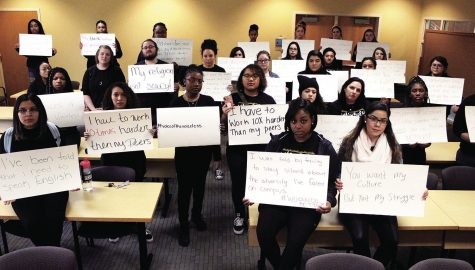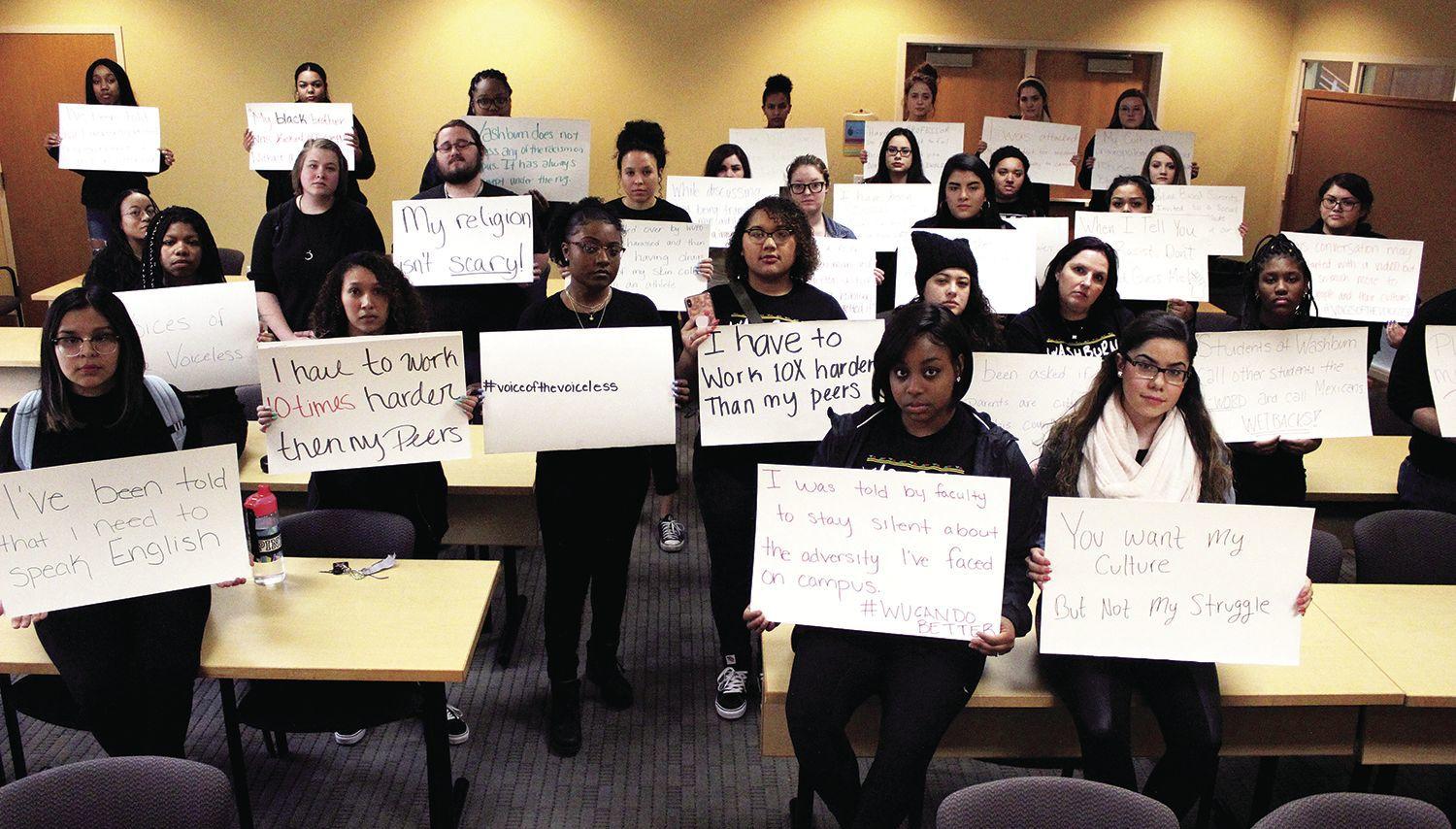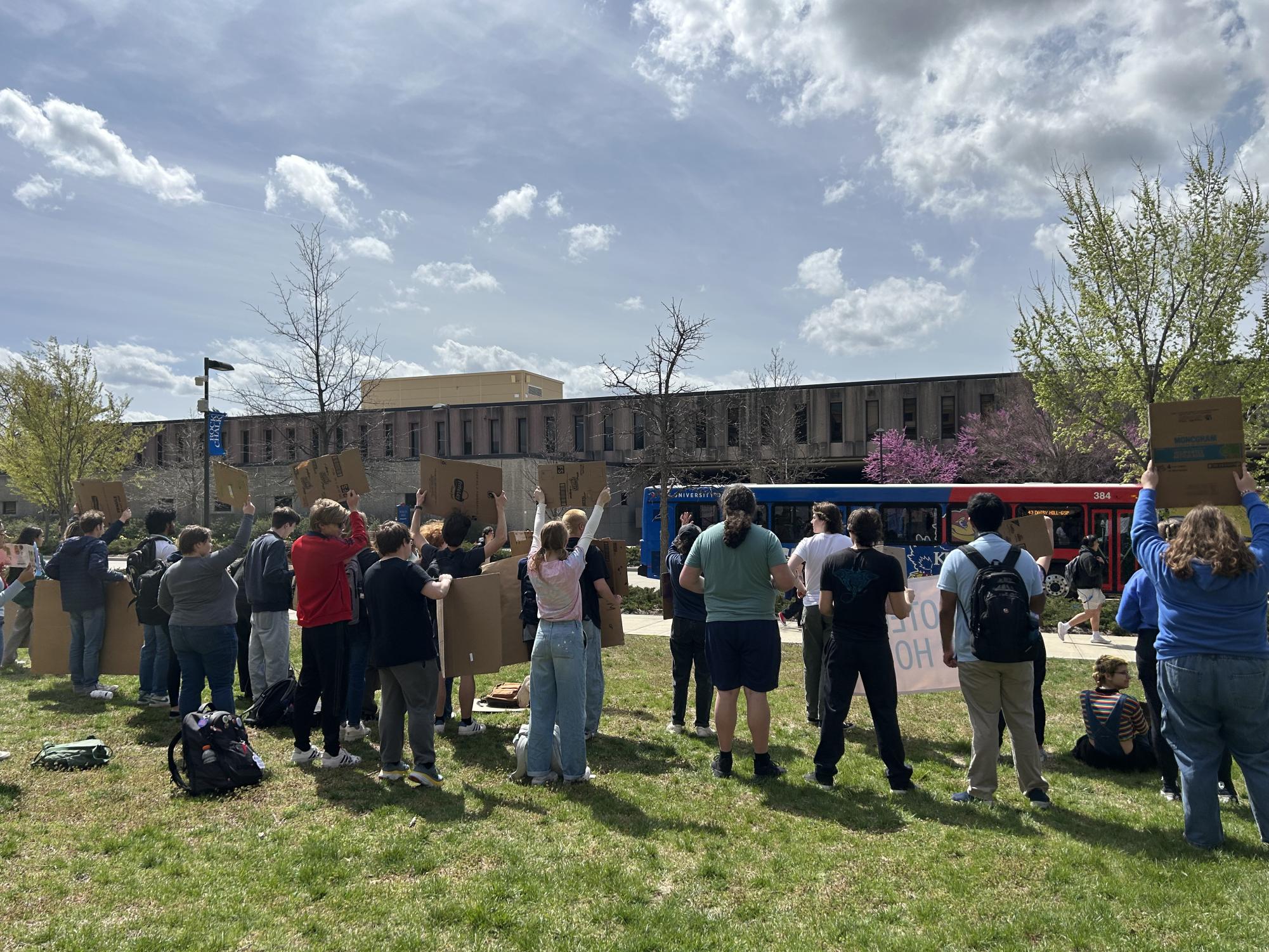#WUCanDoBetter sparks conversations of campus and policy changes
In response to the recent campus climate after a video featuring a part-time Washburn student uttering an offensive racial slur on social media, the Washburn community has stepped into action. Amid tension, bitterness and long-overdue or downplayed discussion, campus leaders and regular students have taken it upon themselves to push for and be the change that Washburn University needs.
“Even before these incidents happened, we have been talking a lot about how WSGA can better represent the entire student body,” said WSGA president Zac Surritt. “We really want to make sure that on a daily basis, not just Wednesdays [during senate meetings] that we strive to fulfill our motto of ‘students serving students.’ I think that what we did last night and on Tuesday night with the press releases, we are taking steps to do just that. However, it’s not the end. We have committed ourselves to a seat at the table and now it’s up to the university and the student body to sit down with us.”
Surritt has seen this happening already in a very tangible way. At the senate meeting on Wednesday, March 7, students unaffiliated with WSGA joined the three-hour long meeting and helped write one of the resolutions passed by WSGA to research and push for policy change on senate election ballots. Surrit commends these students for their dedication to having their voices heard.
“The simple thing is that we want to represent students as best as we can,” said Surritt. “We’ve had this conversation before the incident and we’ll continue to have it after. It’s about taking action on the words we voted on in those resolutions. We will continue to do that.”
Similar action is seen from faculty as a task force is appointed by the Faculty Senate for the purpose of reviewing how the university responds to incidents such as this most recent one. The Faculty Senate voted by a majority to create the task force and asked for volunteers. Four members of the senate volunteered for the position, one being Chris Jones, assistant professor and director of the religious studies program.
“We volunteered because we think this is a problem,” said Jones. “We do hear minoritized students saying that they aren’t being heard, that they don’t feel fully included in the campus, so we want to make it better; we want to change things.”

The role of the task force will be to present a proposal to the faculty senate based on responses solicited from students over the weeks following the incident. Jones expressed intent of gathering a wide range of input from students, then meeting with the task force to share input and put the formal proposal together. The specifics of the proposal’s intent are not solidified yet but could potentially influence university policy moving forward.
Both Surritt and Jones share similar concern for students, campus climate and university policy circulating the issues of racial inequality and diversity and inclusion. These concerns are being reflected in action steps in the areas of discussing policy change and engaging and supporting students, especially those belonging to minorities.
“We have to advocate to the university for a change in policy, procedure or course of action,” said Surritt. “I am very comfortable in saying that the university listens to us [WSGA] and they care about what we pass. When we say we are going to advocate for something it means that not only me, but the executive staff and our senators are going to show up in offices and talk to people and something is going to happen.”
“Part of the university’s mission is to be inclusive,” said Jones.” And part of our federal mandate is to make sure that students get an equal education and access to that education regardless of ethnicity, race, background or other factors. If students feel unsafe here and that affects their education, we are not in compliance with federal law, so we have a mandate to make it better.”
A major contributor to healing and progress on campus is the act of listening to each other’s stories. There are multiple ways to do this, both on small and large scales. Jones encourages students to email him with concerns that can be addressed personally or, with consent, used in task force considerations. Surrit welcomes students to send emails, visit the WSGA office or even attend senate meetings to voice their concerns.
“The number one thing for faculty: listen to your students and hear them,” advised Jones. “Take seriously what students say. We as faculty are predominately white. When students of color speak up about their experiences, don’t minimize. Don’t assume they’re overreacting. Instead, hear them as they’re really saying it. Regardless of your impression of what they [students] say, if they feel unsafe, they are unsafe; that is their reality. As a person who does not wear that skin, you don’t get to decide how they react.”
Another issue that WSGA has already begun taking action on is that of racially targeted speech on a WSGA candidate’s election ballot. In addition to passing a resolution officially stating their stance on the issue, WSGA has also been working to revise ballot submittal and has been in conversation with university leaders over possible changes to academic policy.
“What we can do is look at what they’ve chosen to put on the ballot, and we will be rewording some of that,” said Surritt. “It will say ‘this will be public knowledge’ at the top. It also will say, ‘if elected, what are your goals as a WSGA senator?’ instead of ‘what is your platform?’ We’re also going to have conversations with the vice president of academic affairs about the possibility of adding more curriculum concerning diversity and how we can manage that between core requirements and academic policy.”
The next major step that the university took towards addressing campus climate was through the listening session hosted at 4:30 p.m. Monday, March 18 in Convocation Hall at Bradbury Thompson Alumni Center. The session was opened by University President Jerry Farley giving a statement on behalf of the university regarding their intolerance for discriminative and hurtful language. The session was then conducted by vice president of Student Life Eric Grospitch and vice president of academic affairs JuliAnn Mazacheck who opened by sharing specific plans for the university moving forward.
A group of students met shortly before and marched into the session together wearing black clothing and holding signs displaying their stories and others’ stories of discrimination or sentiments of struggle.
Melissa Tovar spoke of the group’s decision to wear all black to the event. “It’s black. It’s powerful and makes a statement.”
This is exactly what happened when the group of students marched into the listening session together in solidarity to support one another.
During the brief forum, a few students and faculty expressed their experiences of discrimination and ideas they wish for Washburn to implement.
Ali Longstreet, president of Washburn Black Student Union, was the first of the audience to speak. “We have shared our stories, and that’s why we have the signs. We wanted you guys to have to read our stories instead of each of us having to share our stories, yet again,” explained Longstreet.
“We’ve done a lot of talking on campus. We’ve been here before. People have asked us what have happened and we’ve told them, just to experience not a lot of turn around from Washburn,” she continued.
“We want to know dates, plans, where the money is going to come from, who will be overseeing these plans and when are we finally going to see results?” questioned Longstreet.
“They [Washburn] want to be a diverse campus. They want to say it’s a diverse campus. You can recruit us, but you can’t keep us because of what we have to face and the issues we have to deal with by ourselves. We feel like we don’t have the support we need to stay here,” stated heartfully by Longstreet.
“If we don’t start showing care and compassion, in this entire education, what are we doing?” questioned Nicole Graves of the Ichabod ignite program.
Dr. Grospitch and Dr. Mazacheck concluded the discussion by stating that their doors are open to any and all students.
Danielle Demsey-Swopes, director of university diversity and inclusion, explains her view on the matter.
“Part of the challenge for me, is that people think diversity work is just the works of this office and it’s not. I’m hoping that our discussions really inspire people to lead from where they are. So if they’re in a student organization and are a student organization leader, they should be thinking about how to make that organization inclusive. Everybody on campus has some role to play in making this a more inclusive and welcoming place. If they use these discussions to hear students’ stories and think about where they might have impact to make change to affect those stories, that’s what makes this a very different place,” said Dempsey-Swopes.
Your donation will support the student journalists of Washburn University. Your contribution will allow us to purchase equipment and cover our annual website hosting costs.












